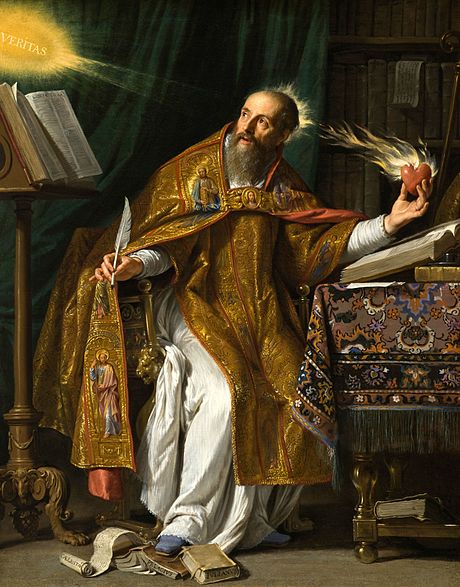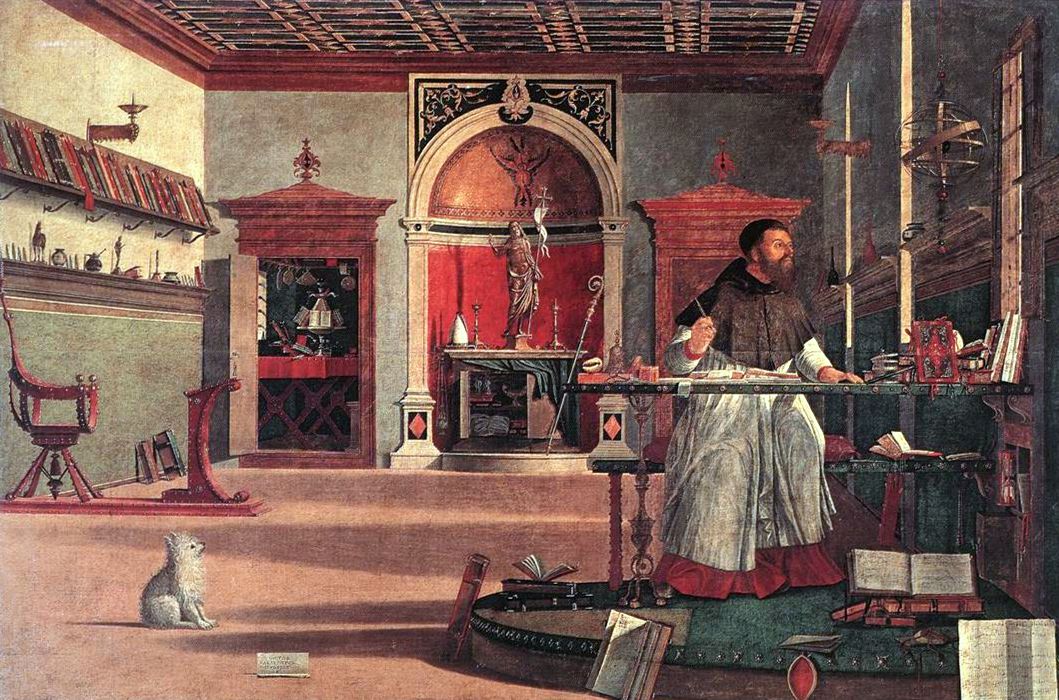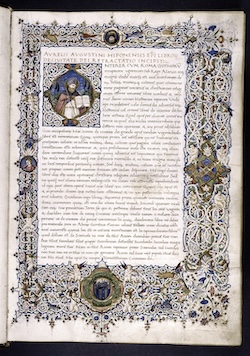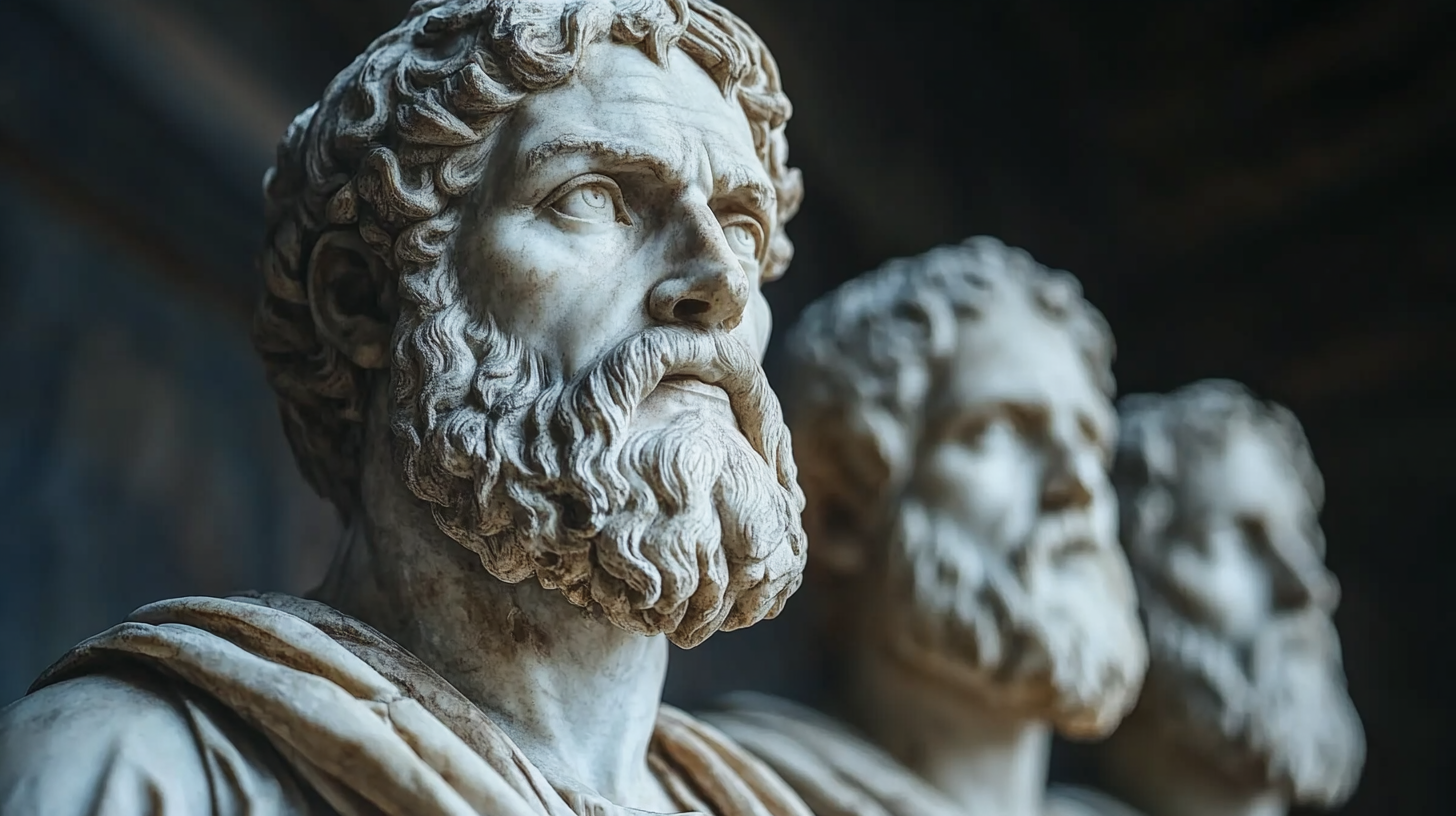Augustine of Hippo (354–430 CE) was a prominent early Christian theologian and philosopher whose writings significantly shaped Western Christianity and philosophy. Born in Thagaste (modern-day Algeria), he initially lived a hedonistic lifestyle before converting to Christianity at age 31, influenced by his mother, Monica, and the preaching of Bishop Ambrose. His most famous works, Confessions and The City of God, explore themes of sin, grace, free will, and the relationship between the earthly and divine realms. Augustine developed the concept of original sin, arguing that humanity inherits a fallen nature from Adam and Eve, redeemable only through divine grace. As bishop of Hippo Regius, he defended Christian doctrine against heresies like Manichaeism, Donatism, and Pelagianism, leaving a lasting legacy in theology and ethics.
Get started

St. Augustine in His Study (also known as Vision of St. Augustine) is a masterful oil painting by the Italian Renaissance artist Vittore Carpaccio, created around 1502–1507. The scene depicts St. Augustine seated in his study as he writes a letter to St. Jerome. According to legend, Augustine pauses mid-composition as a mystical light floods the room, accompanied by Jerome’s voice announcing his imminent death and ascent to heaven.

Saint Augustine
Augustine's Confessions, written around 397-400 AD, is a foundational work in Western literature and Christian theology, blending autobiography with deep philosophical and spiritual reflection.

Saint Augustine
Monumental work of Christian philosophy that defends the faith against pagan critics, arguing that history unfolds as a conflict between the the divine kingdom and earthly powers.

Feb 12, 2025

The Cardinal Virtues are foundational to living a moral and faithful Catholic life. They are called "cardinal" from the Latin word cardo, meaning "hinge," because all other virtues hinge upon them. The four virtues of Prudence, Justice, Fortitude, and Temperance are essential for guiding human behavior in accordance with God’s will.
Saint Augustine of Hippo (354–430 CE) is a towering figure in Christian theology, philosophy, and Western intellectual history, whose life and writings continue to shape Catholic doctrine and spiritual reflection. Born on November 13, 354, in Thagaste (modern-day Souk Ahras, Algeria) in Roman North Africa, Augustine was the son of a Christian mother, Monica, and a pagan father, Patricius. His early life was marked by intellectual curiosity and moral restlessness, a period he later chronicled in his seminal work, Confessions. Raised in a modest household, Augustine excelled in rhetoric and pursued a career as a teacher, first in Carthage, then Rome, and finally Milan. Yet, his youth was also defined by a hedonistic lifestyle—indulging in pleasures, fathering a son named Adeodatus out of wedlock, and dabbling in the dualistic religion of Manichaeism, which promised answers to life’s mysteries but ultimately left him dissatisfied.
Augustine’s conversion to Christianity at age 31 was a transformative turning point, catalyzed by the persistent prayers of his mother, Monica, and the eloquent preaching of St. Ambrose, Bishop of Milan. In 386, while in a garden in Milan, Augustine heard a child’s voice chanting, “Take up and read,” prompting him to open the Bible to Romans 13:13-14, a passage urging a rejection of debauchery for a life in Christ. This moment, recounted in Confessions, marked his surrender to divine grace, ending years of inner turmoil. Baptized by Ambrose in 387, Augustine returned to Africa, where he was ordained a priest in 391 and consecrated Bishop of Hippo Regius (modern Annaba, Algeria) in 395, a role he held until his death on August 28, 430, amid the Vandal siege of Hippo.
As a theologian and pastor, Augustine’s contributions were vast and profound, addressing core questions of sin, grace, and human destiny. His most celebrated works, Confessions and The City of God, encapsulate his thought. Confessions, a pioneering autobiographical and spiritual text, explores his journey from sin to salvation, weaving personal narrative with meditations on time, memory, and God’s mercy. Its famous line, “You have made us for Yourself, O Lord, and our heart is restless until it rests in You,” reflects his belief in humanity’s innate longing for God. The City of God, written after the sack of Rome in 410, contrasts the ephemeral “City of Man” with the eternal “City of God,” offering a Christian philosophy of history that countered pagan claims that Rome’s fall stemmed from abandoning traditional gods. This work became a cornerstone of medieval thought, framing earthly struggles within a divine narrative.
Augustine’s doctrine of original sin stands as one of his most influential legacies. He argued that humanity inherits a fallen nature from Adam and Eve’s disobedience, a condition that taints all human will and can only be redeemed through divine grace, not human effort. This view emerged in his fierce opposition to Pelagianism, a heresy asserting that humans could achieve salvation through moral striving alone. Augustine’s emphasis on grace as an unmerited gift shaped Catholic soteriology and later influenced Protestant reformers like Martin Luther and John Calvin. Similarly, his battles against Manichaeism—where he rejected its dualism for the goodness of God’s creation—and Donatism—where he defended the Church’s unity despite human flaws—solidified orthodox Christian teachings.
Beyond theology, Augustine bridged classical philosophy and Christian faith, drawing heavily on Platonism to explore metaphysical questions. In Confessions (Book XI), he pondered time as a subjective experience, suggesting it exists only in the mind’s perception of past, present, and future—a revolutionary idea for his era. His concept of evil as a privation of good, rather than a substance, reconciled the existence of suffering with an all-good God, influencing thinkers like Thomas Aquinas. Augustine’s Trinitarian theology, detailed in De Trinitate, further enriched Christian doctrine by likening the Trinity to human faculties of memory, understanding, and will.
Augustine’s legacy extends far beyond his lifetime. As a Doctor of the Church, his writings—over 5 million words across sermons, letters, and treatises—became foundational for medieval scholasticism, the Reformation, and modern ethics. His focus on the interior life inspired mystics and spiritual seekers, while his pastoral care as bishop—preaching, mediating disputes, and comforting his flock amid chaos—exemplified Christian leadership. Dying as the Roman Empire crumbled, Augustine’s vision of an eternal City of God offered hope and stability, a testament to his enduring relevance. Today, his insights into human nature, grace, and divine love remain vital to Catholic theology and the broader quest to understand God’s creation.
